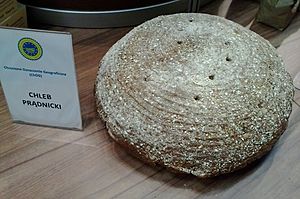Prądnik bread facts for kids

Prądnik bread
|
|
| Alternative names | Chleb prądnicki |
|---|---|
| Type | Bread |
| Course | Bread |
| Place of origin | Poland |
| Serving temperature | Cold |
| Main ingredients | Dough: secale |
Prądnik bread (in Polish: Chleb prądnicki) is a very old and special kind of rye bread. It is baked in the city of Kraków, Poland. This bread can be huge, sometimes weighing as much as 14 kilograms! It is also a "protected produce," which means it has a special status in the European Union to show it comes from a specific place and is made in a traditional way.
Contents
What Makes Prądnik Bread Special?
Prądnik bread is known for its large size and its unique taste. It is made mainly from rye flour, which gives it a dense texture and a rich, slightly sour flavor. Because it is so big, it stays fresh for a long time. This was very important in the past when people needed food that would last.
Where Does Prądnik Bread Come From?
This special bread gets its name from the Prądnik River. It was first made in villages located along the banks of this river, like Prądnik Czerwony and Prądnik Biały. People have been baking this bread there since the 1300s!
The River's Role in Baking
For hundreds of years, the power of the Prądnik River was used to help make the bread. The river's flowing water turned watermills. These mills were used to grind grain into flour, which was then used to bake the bread. This made the baking process easier and faster.
A Long History of Baking
Prądnik bread has a very interesting history, with records going back a long time.
The First Mentions of Prądnik Bread
The oldest known document that talks about Prądnik bread is from the year 1421. In this document, the Bishop of Kraków, named Albert, gave some land to his cook. The cook's job was to bake bread for the bishop's household. This shows that Prądnik bread was important even back then!
Royal Permission to Sell Bread
Later, in 1496, King John I Albert gave a special permission to the bakers from the Prądnik River area. This permission, called a "royal prerogative," allowed them to sell their bread in Kraków once a week. They could sell it during the market that happened every Tuesday. This was a big deal because bakers from outside Kraków usually had rules about where and when they could sell their bread. It wasn't until 1785 that all bakers had the same rights to sell their products freely.
 | William L. Dawson |
 | W. E. B. Du Bois |
 | Harry Belafonte |

